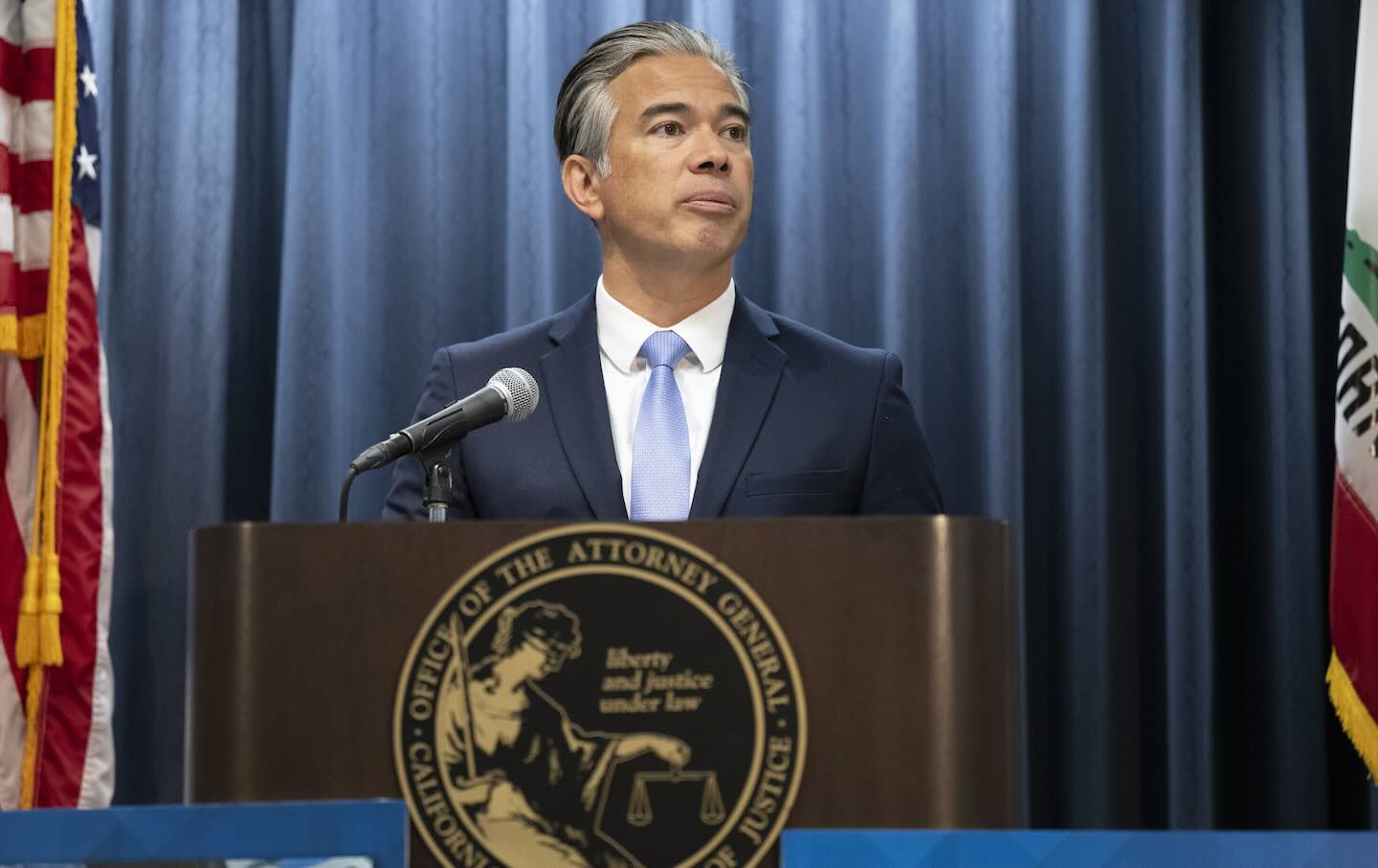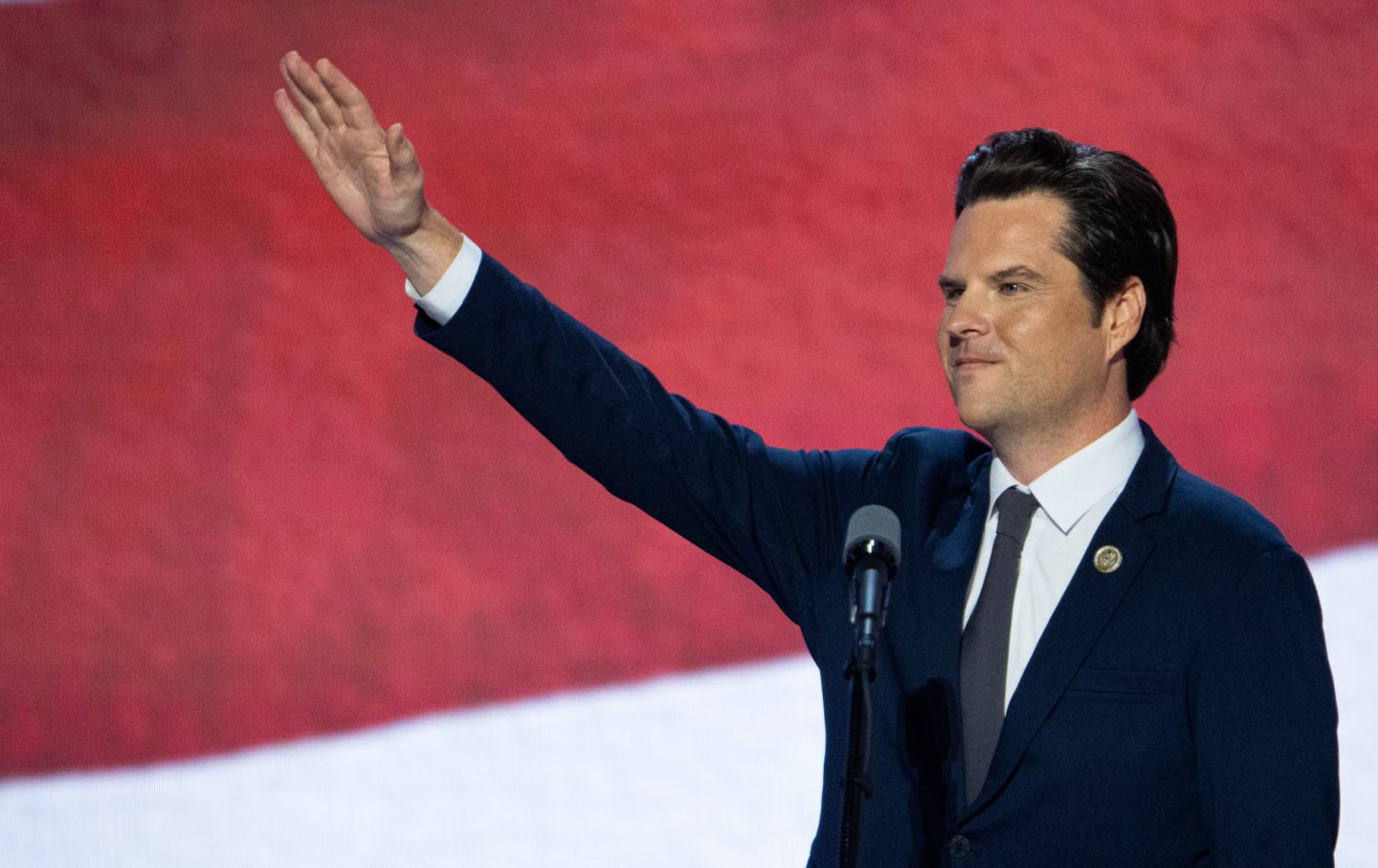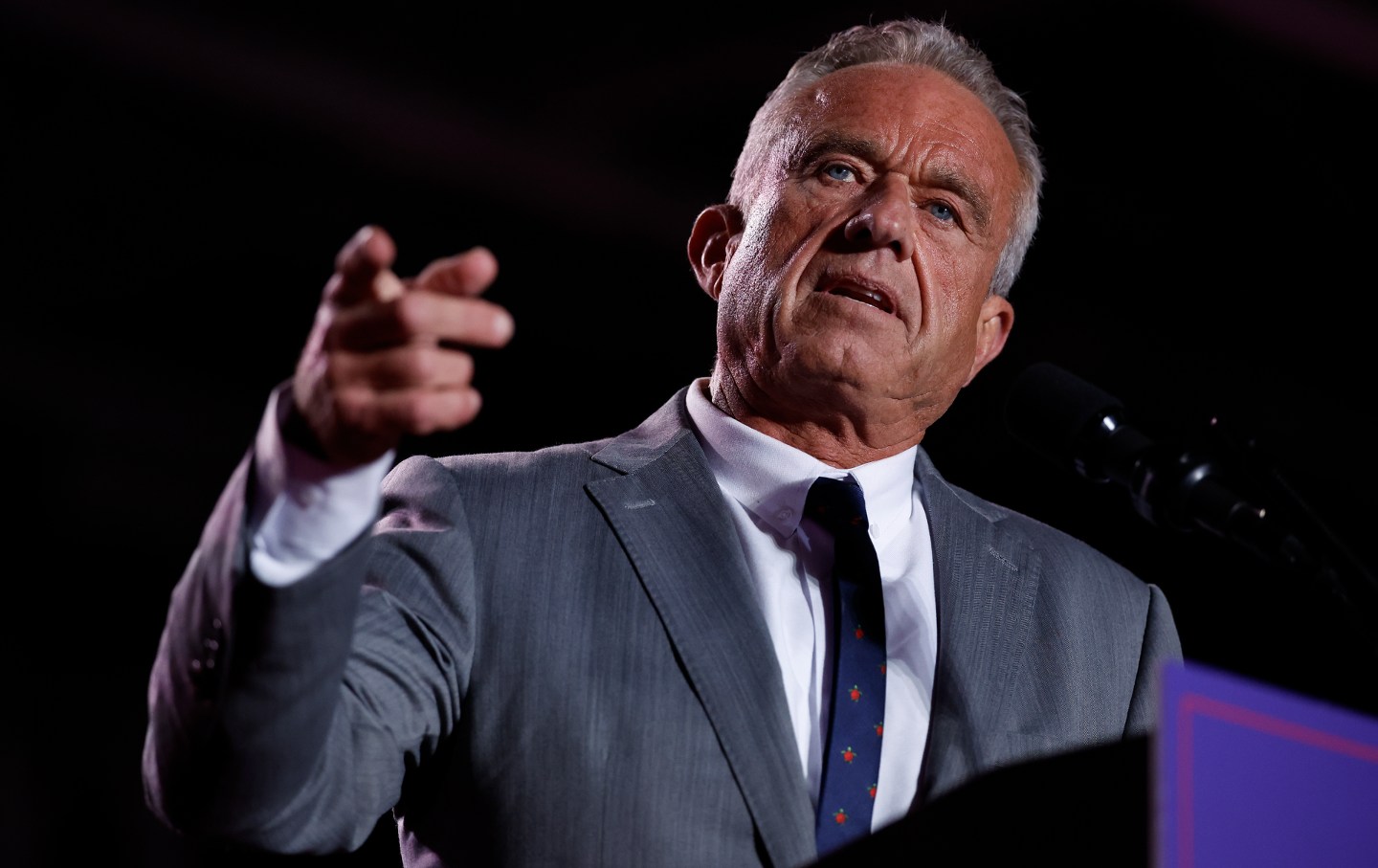The Most Committed Are the Uncommitted
A growing movement of “uncommitted” Democratic voters are making it impossible for the Biden White House to remain complacent about Israel’s war on Gaza.

People gather at an Uncommitted Minnesota watch party during the presidential primary in Minneapolis, Minn., on Super Tuesday, March 5, 2024.
(Photo by Stephen Maturen / AFP)With his lifelong history as perhaps the most ardently pro-Israel politician in the United States (not an easy feat to achieve), Joe Biden has every reason to resent the “uncommitted” voters, who have made visible the growing dissatisfaction within the Democratic Party of the president’s near-total support for the Israeli assault on Gaza. The Biden presidency seemed to be working on the assumption that they could disregard polls that find Israel’s war to be deeply unpopular with the base of his party, notably an Economist/YouGov poll in January showing that 49 percent of Democrats think that Israel is committing genocide in Gaza (while only 21 percent think the current war is not a genocide).
But it’s unlikely that voters who think their president is supporting a genocide will be enthusiastically rushing to the ballot box in November. Nor does Biden have a deep well of personal popularity (of the sort enjoyed by Barack Obama) to counteract a deeply unpopular policy choice. On Tuesday, the polling aggregator FiveThirtyEight reported that Biden’s favorability is at an all-time low of 37.4 percent, one of many polls showing a reelection campaign currently on the path to losing.
Biden’s adamant refusal to shift policy despite this dire number has puzzled many. In a February interview with CNN, former MSNBC host Mehdi Hasan said, “I think it’s crazy that Joe Biden is willing to wreck his presidency, potentially, and American democracy if Trump gets back in, for Benjamin Netanyahu.” One answer to Hasan’s incredulity is that the Biden reelection campaign has developed an elaborate system of denial to wave away bad news. As documented in an extensive New Yorker article by Evan Osnos published on March 4, Biden and his team have convinced themselves that the polls are flawed and that voters, including Arab American voters in crucial swing states, will see the light soon enough.
Underlying this complacent strategy seems to be the assumption that at the end of the day voters are rarely motivated by foreign policy and that hatred of Trump would overwhelm any qualms about Biden. The president is in effect playing a game of chicken with his own voters, doing what he wants in defiance of their pleas and daring them to vote for Trump if they don’t like it. The underlying premise of this dangerous game is that voters will put the issue aside come Election Day because it will have become less important to them than domestic politics. This premise, of course, ignores the reality that for many voters Israel’s war on Gaza is not a foreign policy issue but a civil rights issue, as well as a matter of survival for those with loved ones in Gaza and other occupied territories.
The complacency of the Biden reelection campaign is one of the biggest factors that could put Trump back in the White House. Ironically, with the growing movement of “uncommitted” voters, the Democrats who are angriest at Biden are trying to save the president from his worst instincts of overconfidence and smugness. By showing that there is a significant block of Democratic voters who are willing to make a stance in the primaries expressing dissatisfaction with Biden, the “uncommitted” movement has made it impossible for Biden to bury his head in the sand.
Washington Post columnist Perry Bacon Jr. notes that in recent weeks the Biden administration has shifted on Israel, at least on a rhetorical level, with a greater willingness to openly criticize Israeli Prime Minister Benjamin Netanyahu and use the words “cease-fire.” Bacon argues that “activists in the United States calling for Biden to rethink his Israeli-Palestinian policies are running a very smart protest movement, using tactics that are building momentum for their cause and increasing dissatisfaction with the White House’s handling of this issue.”
Bacon called attention to the movement’s “smart tactic” of “organizing Democrats to vote ‘uncommitted’ in the primaries. Polls have shown for months that a large bloc of Democrats oppose Biden’s Gaza policy. But having more than 300,000 people in several states vote against the president showed that those polls reflected a reality on the ground.”
At least on the Hill, the ground is shifting. On Thursday, Senate majority leader Chuck Schumer, scarcely less perfervid in his Zionism than Biden, sharply rebuked Netanyahu and called for new elections in Israel.
The “uncommitted” movement deserves a large share of the credit for this newly critical tone, but it is hardly satisfied by it. In a phone conversation on Thursday, Layla Elabed, one of the leading organizers and a campaign manager of Listen to Michigan, told The Nation that the evolution of the Democrats has so far been merely rhetorical. The movement, she insisted, wanted “action” and not “words.”
The movement was ignited by a memo written in early January by Waleed Shahid, a veteran Democratic strategist. In the memo, Shahid noted that the media was turning its eye away from Gaza to focus on the presidential primaries. Since then, the “uncommitted” voters have kept the carnage of Gaza front and center of media and political attention during the primaries.
In an interview on the podcast Chapo Trap House that was posted on March 8, Shahid observed that “the main purpose of the uncommitted campaign was to literally get the political class and the media class to listen to the voices of Palestinian Americans, Arab American, [and] young people who are pissed off about President’s Biden’s funding of a genocide in Gaza. And I think we’ve been enormously successful at getting the media to pay attention to the voters who are currently uncommitted to the president’s reelection unless he dramatically changes course and ends funding to the war.”
The “uncommitted” campaign is trying to save Biden from his own self-destructive mulishness. The name of the movement is a misnomer. “Uncommitted” suggests a feckless unwillingness to make a choice. But “uncommitted” voters are super committed. Even as they loath a major foreign policy of the president, they are engaging with the political process to make their voices heard. They are avoiding the easier path of disengagement and non-voting.
Popular
“swipe left below to view more authors”Swipe →The primaries aren’t over, and the movement still has work to do. The big prize coming up is Wisconsin on April 2, a swing state with the base of organizing that could score a victory comparable to Minnesota (where “uncommitted” got 19 percent of the vote), Hawaii (29 percent), and Michigan (13 percent).
Because elections are run by state parties and have ramshackle rules, it’s not always possible to vote “uncommitted.” But even in places where that isn’t an option, such as New York State, voters can still send a message by handing in a blank ballot, which will be counted in the final tally.
The political analyst Josh Cohen has posted a useful voter’s guide for the upcoming primaries showing the best way to register protest in each one. If your inclination is to show your commitment by voting “uncommitted,” he offers an essential road map for the primary battles to come.
We cannot back down
We now confront a second Trump presidency.
There’s not a moment to lose. We must harness our fears, our grief, and yes, our anger, to resist the dangerous policies Donald Trump will unleash on our country. We rededicate ourselves to our role as journalists and writers of principle and conscience.
Today, we also steel ourselves for the fight ahead. It will demand a fearless spirit, an informed mind, wise analysis, and humane resistance. We face the enactment of Project 2025, a far-right supreme court, political authoritarianism, increasing inequality and record homelessness, a looming climate crisis, and conflicts abroad. The Nation will expose and propose, nurture investigative reporting, and stand together as a community to keep hope and possibility alive. The Nation’s work will continue—as it has in good and not-so-good times—to develop alternative ideas and visions, to deepen our mission of truth-telling and deep reporting, and to further solidarity in a nation divided.
Armed with a remarkable 160 years of bold, independent journalism, our mandate today remains the same as when abolitionists first founded The Nation—to uphold the principles of democracy and freedom, serve as a beacon through the darkest days of resistance, and to envision and struggle for a brighter future.
The day is dark, the forces arrayed are tenacious, but as the late Nation editorial board member Toni Morrison wrote “No! This is precisely the time when artists go to work. There is no time for despair, no place for self-pity, no need for silence, no room for fear. We speak, we write, we do language. That is how civilizations heal.”
I urge you to stand with The Nation and donate today.
Onwards,
Katrina vanden Heuvel
Editorial Director and Publisher, The Nation
More from The Nation

Democrats Must Do Everything They Can to Block the Dangerous Nonprofit Bill Democrats Must Do Everything They Can to Block the Dangerous Nonprofit Bill
The House passed a bill aimed at giving the government sweeping powers to crush nonprofits and attack supporters of Palestine. Democrats need to stand firmly in its way.

California Is Ready to Go Toe to Toe With Trump 2.0 California Is Ready to Go Toe to Toe With Trump 2.0
“We’ve thought about all the possibilities, and have prepared for every one of them,” said AG Rob Bonta, “and are ready to take action when there’s any unlawful activity.”

BREAKING: Matt Gaetz Quits, and Journalism Still Matters—a Lot BREAKING: Matt Gaetz Quits, and Journalism Still Matters—a Lot
Forty-five minutes after CNN contacted Trump’s attorney general nominee about additional allegations of sexual misconduct, he was done.

The Red Wave Didn’t Hit Statehouses in This Election The Red Wave Didn’t Hit Statehouses in This Election
State-level Democrats largely held their ground, even scoring key victories in battleground states—and under Trump, that’s going to matter.

How Nominally Pro-Choice RFK Jr. Can Get Anti-Abortion Groups to Back His HHS Nomination How Nominally Pro-Choice RFK Jr. Can Get Anti-Abortion Groups to Back His HHS Nomination
He can pick a strident abortion opponent like Roger Severino, who wrote the Project 2025 chapter on HHS, as his number two.



